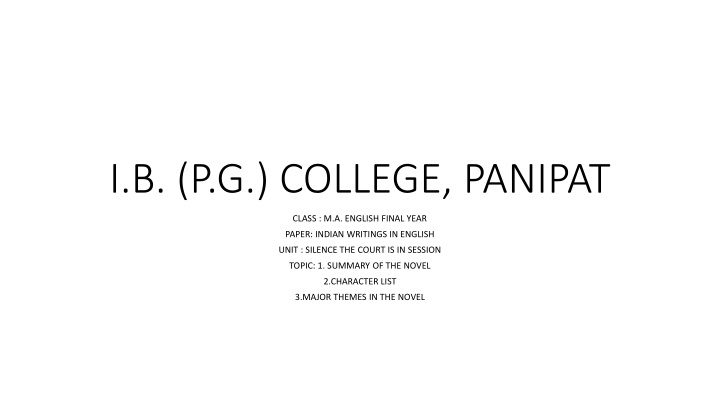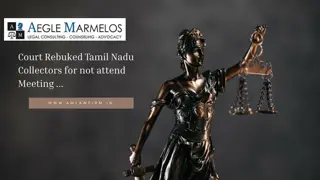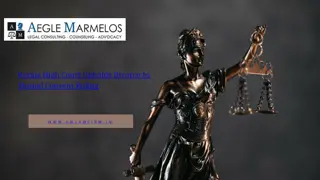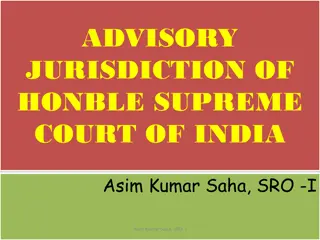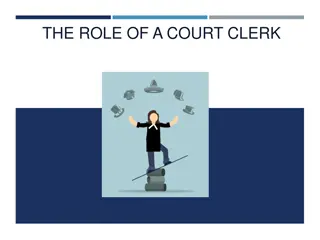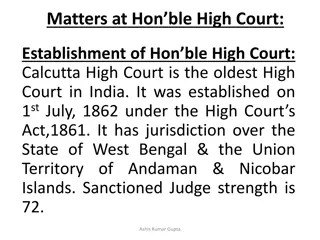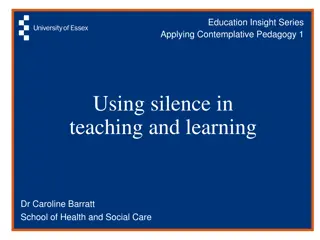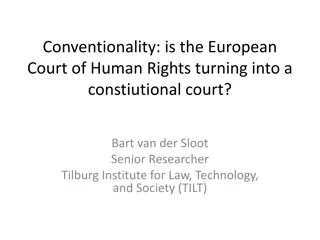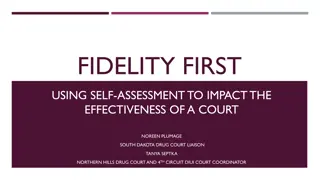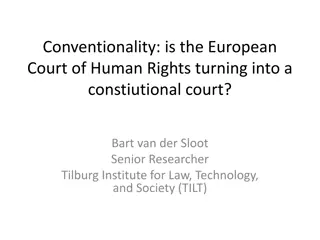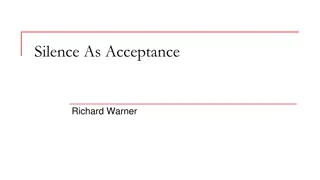Silence! The Court Is in Session: A Critical Analysis
"The play 'Silence! The Court Is in Session' by Vijay Tendulkar revolves around a group of teachers staging a play that leads to unexpected revelations. It delves into themes of truth, manipulation, and societal norms, reflecting Tendulkar's political views. The narrative unfolds with a mock trial setting, unearthing personal secrets and challenging perceptions. Tendulkar's impactful storytelling has earned accolades in both playwriting and film adaptation, leaving a lasting mark on Indian cultural narratives."
Download Presentation

Please find below an Image/Link to download the presentation.
The content on the website is provided AS IS for your information and personal use only. It may not be sold, licensed, or shared on other websites without obtaining consent from the author.If you encounter any issues during the download, it is possible that the publisher has removed the file from their server.
You are allowed to download the files provided on this website for personal or commercial use, subject to the condition that they are used lawfully. All files are the property of their respective owners.
The content on the website is provided AS IS for your information and personal use only. It may not be sold, licensed, or shared on other websites without obtaining consent from the author.
E N D
Presentation Transcript
I.B. (P.G.) COLLEGE, PANIPAT CLASS : M.A. ENGLISH FINAL YEAR PAPER: INDIAN WRITINGS IN ENGLISH UNIT : SILENCE THE COURT IS IN SESSION TOPIC: 1. SUMMARY OF THE NOVEL 2.CHARACTER LIST 3.MAJOR THEMES IN THE NOVEL
PRESENTED BY DR. VANDANA ROHAL ASSISTANT PROFESSOR I.B. COLLEGE PANIPAT
SILENCE! THE COURT IS IN SESSION BACKGROUND Around eighty three million people speak Marathi, the official language of the South-Western region of India, and it is the first language of Goa, the popular vacation resort. Silence! The Court is in Session (Shanatata! Court Chalu Aahe!) is a play written in the Marathi language by playwright Vijay Tendulkar, and the idea for its plot came to him after he overheard a group of actors on a train as they were traveling to Mumbai to perform in a mock trial. The actual narrative on the play was inspired by a novel by Swiss playwright Friedrich Durrenmatt. The play tells the story of a group of teachers who are planning on staging a play in their small village. When one of the actors in the cast does not turn up for rehearsal, a stage-hand steps into the breach, and so that he can understand how the court procedures that they will be portraying in the play actually work, and so that he is able to bring authenticity to the role, they decide to stage a mock trial. Unfortunately, this unearths some secrets that some of the other cast members would rather have never revealed. First performed in 1967, the play was largely well-received and Tendulkar was awarded the Karmaladevi Chattopadhyah Prize for Drama in 1970. He was also given the Sangeet Natak Akademi Award for his services to playwriting that same year. In 1971, the play was adapted for the big Indian screen and is still considered one of the greatest Indian films ever made. Tendulkar was invited to write the screenplay based on his original script; it was his first time adapting his work for the movies, but it was a monumental success, and he went on to write five more films that are considered to be amongst the top one hundred Indian movies ever made. The best known of these is Umbartha, which was the winner of four major Indian film awards in 1982. As a playwright, Tendulkar had a tendency to weave his own complex political views into the narrative of his plays, basing them on gritty, real-life situations, and more often than not showing Brahmins, a high-ranking Hindu social class, in a negative light because he had been prejudiced against them all his life. His plays are often considered very left wing, reflecting his own far-leftist views. His writing career spanned more than half a century in all, and he wrote over fifty plays. He passed away at the age of eighty, after a hard-fought battle with the auto-immune disease myasthenia gravis by Polly Barbour
SUMMARY OF THE NOVEL The Sonar Moti Tenement (Bombay) Progressive Association is gathering to put American President Lyndon B. Johnson on mock trial for his role in the proliferation of atomic weaponry. The SMTPA is comprised of socially committed activists who try to raise awareness of issues of significance affecting members of their Indian community that might be overlooked in favor of more pressing concerns. As various members of the association arrive, important information about their backgrounds, present circumstances and interrelationship are conveyed. It is also learned that two members of the group Professor Damle and Mr. Rawte were not able to make it to the performance. Performance time is still a few hours away, so those who have made it decide to pass the time through improvisation. Thought the roles that most of them are slated to play remain essentially unchanged, there will be one very great change: a new defendant will be put on trial. Since recently fired schoolteacher Leela Benarehappens to have left the room at this time, the others decide she will be placed on trial. When she returns and discovers what is taking place, she suggests a thievery as a replacement for the crime they have chosen for her: infanticide. The crime was not chosen randomly: the vivacious, early-30 s woman is routinely criticized behind her back by the others for her unconventional lifestyle. Soon enough, it becomes pointedly apparent that there may be little about this trial of Benare that is purely random.
The very purpose of the SMTPA is indicative of the collective opinion the members hold of themselves. They have ordained themselves as an entity charged with educating the more ignorant members of the community; more than just educating them, guiding them to a more elevated understanding of social causes. This elevated opinion of themselves darkly reveals itself as leaning more toward enjoying being judgmental of others than in bringing others up to equal standing. When Balu Rokde offers the enticing new information that in reality he did once see Benare inside the home of Professor Damle (who is there to take part in the performance, remember), the mock part of the trial begins to blend with real life as the predatory nature of the others toward even each other takes over as a local villager named Samant fills in for the missing Mr. Rawte. Samant fabricates a theory to explain what Rokde actually witnessed that day: Benare was having an affair with Damle and wound up pregnant, a scenario which, of course, would naturally end committing the infanticide of which she is charged. The only problem is that Benare s response to Samant s entirely constructed fiction is too emotionally overwrought to be acting and that, in fact, Samant has entirely by accident hit upon a real-life truth. At that point where it seems that an unexpected and ugly truth has inserted itself too deeply into the proceedings to turn back, the mock trial takes on an increasingly dramatic tone. When Benare attempts to flee the room, she finds it has been locked from the outside, trapping her in the role of criminal defendant until the mercy of the others allows their compassion to overcome their emotional greed. The trial continues with testimony from two of the men that Benare pleaded with them to marry her and help protect the child from being raised illegitimately, but that both men rejected her.
Sukhatme takes on the role of the prosecutor in the mock trial, but unknowingly to the audience, he has already made his case against the defendant. It was Sukhatme who originated the suggestion that Benare be the member of the troupe put on trial in the first place. Thus equipped, it should by the time he begins his argument come as little surprise that Sukhatme goes a little overboard in painting Benare as the very embodiment of the corruption of the institution of motherhood. Presiding over the trial is the status-conscious Mr. Kashikar whose maternal-but- childless wife is also a member of the group. In addition to being judge, however, Kashikar breaks with precedent, tradition and convention by temporarily putting aside his judicial robes and taking the stand as witness whereupon he identifies he feels freed of duty and impartiality to the extent that he collective castigates all adult unmarried girls as a sinful canker on the body of society before providing yet more damning evidence Benare. The prosecution having rested, the trial is turned over to the defense to call witnesses. There is just one problem: all three witnesses that could possibly be called to refute any of the allegations being made against Benare just so happen to not be present. The prosecuting attorney goes on to give his closing argument and then, at the judge s request, goes on to present closing arguments for the defense. Judge Kashikar inquires if the Benare has anything at all to say in her defense.
Benare proceeds to give a long speech, now realizing that every single aspect of her life she thought could remain a secret has been exposed, in which she confesses all. Speaking from the heart, she is accusatory as well as contrite, explanatory as well as metaphoric. At the conclusion of his emotionally intense monologue, the judge delivers the guilty verdict as well as the punishment: the illegitimate fetus growing inside Benare is to be aborted. She collapses to the floor. Suddenly, drama is broken by the sound of the locked door being opened by the villagers who have come to the mock trial of President Johnson. As if coming out of dream state, the actors on stage slowly remove the trappings of their characters and become their real selves again. As Benare remains unmoving on the floor, they try to persuade her that it was all nothing but a game and not to be taken seriously, but she remains lifeless. The others leave her there as they wander off to prepare for the scheduled performance until finally the only thing left on stage is her body still crumpled on the floor.
CHARACTER LIST Leela Benare Benare is an unconventional schoolteacher who is not shy about expressing her opinions and lives life just a little off the beaten path. Unfortunately, others see things differently and cast the relatively innocuous independence of the early-30 s single woman in a much harsher and more judgmental light. Thanks to the random timing perhaps of not being in the right room at the right time, she is chosen to play a woman on trial for infanticide in a mock trial that takes a dark turn toward the serious. Sukhatme A major player among the Sonar Moti Tenement (Bombay) Progressive Association, he is usually cast as a lawyer in the association s mock trials. Here he is the attorney in charge of prosecuting the mock case against Benare. It is also Sukhatme who takes advantage of Benare s notable absence from the room when the other members are deciding who should play the defendant who is first to suggest the absent teacher. Samant Two of the regular players in the mock trial have not been able to attend this particular performance and as a result a local villager often called upon by the Association to help with simple care-taking tasks is asked to fill in as a replacement. It is Samant s hypothetical theorizing about what is still viewed as a fictional construct of Benare s case which leads to the realization that fiction and reality are colliding. This collision is exploited to transform the trial into something less of a mock and more an actual persecution.
Balu Rokde Rodke is a young man who relates a story true about seeing Benare with one of the two mock participants who happen not to have shown up for this day s performance of the actual mock trial to take place later. It is this incident which is utterly lacking in any context positive or negative or otherwise from which Samant constructs a fictional potential which accidentally proves to hit too close to the mark of reality. Mr. Kashikar Kashikar is another power player alongside Sukhatme in the Association. His wife is also a member, but is so dominated by her husband as to be practically non-existent except as a notably childless woman whom Benare nevertheless nicknames The Hand that Rocks the Cradle. Kashikar sits in judgment as the presiding justice overseeing the mock trial court, but towards the end makes an unprecedented break with all legal convention by taking the stand as a witness speaking harshly against the defendant just minutes before he delivers the verdict and subsequent announcement of the terms of punishment.
MAJOR THEMES IN THE NOVEL The Power of the Patriarchy The play is all about male domination. Benare is put on trial for being an unmarried single woman in her thirties. It is disguised as a trial about a criminal violation of the sanctity of the heavenly concept of motherhood, but make no mistake. Benare is guilty because she is a single, unmarried pregnant woman. And that makes her dangerous to men who live for the institution of marriage to codify dominance over women. That the man who fathered the illegitimate child growing inside her escapes being put on trial and punishment is merely the cherry topping the patriarchal cake.
The Failure of the Justice System The play is about a mock trial. Actually, it is about a mock mock trial; the actual mock trial is scheduled to take place later, what is witnessed on stage is a quickly slapped together improvisation. So, right from the start, the judicial system is being mercilessly satirized. The mocking of the inherent systemic unfairness of the Indian court system continues on unabated as it inexorably moves toward its centerpiece: a judge who takes the witness stand and a single lawyer representing both the prosecution and the defense.
Seeming and Being To Benare, the mock trial is a personal attack against her morality and independence. To the others, it is merely a game. To Karnik, a minor character, the idea of the trial as a game simply means nothing more than a chance to perform; he has no real interest in attacking Benare for her behavior. For the prosecuting attorney Sukhatme, the insistence that the trial is not really an assault upon the woman, but upon the fictional crimes of the character she is playing is much more complex. The entire conceit of the mock trial about a fictional defendant being a fa ade that covers the truth about what is really going on is an expression of the theme which also covers how the expression of respect for motherhood is really a fa ade for the truth that it is about protecting male dominance.
